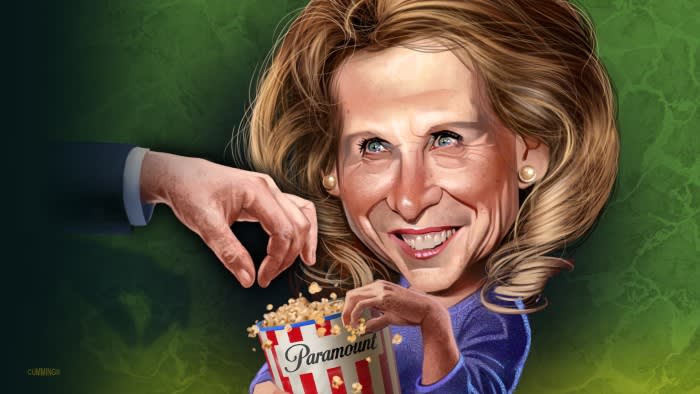Shari Redstone endured decades of brutal, Succession-worthy corporate and interfamily combat before she was finally able to take over the entertainment company that her father, Sumner, had ruled with an iron fist.
But by early 2022, two years after his death, Redstone was putting her own stamp on the family business, laying out an ambitious strategy to take on Netflix and changing its name to Paramount.
By Redstone’s side as she announced this new vision was her trusted chief executive, Bob Bakish. The two had an easy rapport, swapping lines from Paramount’s Top Gun. “I feel the need — the need for speed!” Bakish exclaimed. “You go, Maverick!” Redstone responded.
It has been a rocky run ever since. The streaming service, Paramount+, has lost billions of dollars, the company’s shares have fallen by 50 per cent and its debt was recently downgraded to junk. This week, Redstone dismissed Bakish just as she faces the critical decision over whether to sell the family business — and to whom.
Some executives and observers in Hollywood say Redstone’s tenure atop her family’s empire has been nothing short of tragic. Her critics argue it was delusional to thrust Paramount headfirst into a costly streaming battle with the much larger Netflix and Disney.
“Any scion who is around the empire for a long time, you start to think, ‘Well, I guess I belong here’ . . . I think she finally got the keys and it was irresistible not to take a crack at it,” says a media executive who knows the Redstones. “Unfortunately, she walked into this thing in the middle of a tsunami.”
That tsunami is the disruption that has swept over Hollywood in the Netflix era. Cable television and cinema-going, the lifeblood of the Redstone empire, have been ravaged.
Seeing the writing on the wall, Redstone has been negotiating a merger with Skydance, a Hollywood studio run by David Ellison — son of billionaire tech executive Larry — that has produced blockbusters such as Top Gun: Maverick. Skydance’s complicated offer would give Redstone a payday of about $2bn, but common stockholders complain that it will leave them out.
As Redstone plotted with Ellison, fellow scion of a billionaire, Bakish was left in the dark, according to a person close to her. Frustrated, he began searching for other deals that could save his job, triggering his dismissal by the board this week, say people familiar with the matter. Though Bakish is gone, another suitor has appeared. Private equity group Apollo and Sony presented a joint $26bn offer to Paramount this week. Redstone is said to prefer the Ellison bid, but shareholders may disagree.
Growing up in the suburbs of Boston, Shari watched her father transform her grandfather’s small cinema chain into a global media conglomerate. She studied law, like her father, and practised criminal law. But after having children, she prioritised staying home. “The one thing I was determined to do was never work in the family business,” she said.
It was not until her 40s, fresh from a divorce, that Shari relented, becoming executive vice-president of her father’s company, National Amusements. Her ascent has been unusual. While family succession is common in the media industry, it is typically limited to fathers and sons. Now 70, chatty and still with a heavy Boston accent, she is always keen to discuss baking recipes or her favourite TV shows. While she inherited her father’s strawberry blond hair, the relationship between Shari and Sumner was volatile.
Some say she was her father’s favourite child. But he also insulted her in public and private. He delivered abuse via fax, sometimes calling her the C-word. He publicly dangled the idea that Shari would succeed him, then said the opposite. In 2015, Shari wrote to her son: “Your grandfather says I will be chair over his dead body.” Sumner Redstone was just as hard on her mother, Phyllis, who was “verbally and physically and financially abused by him every day of her life”, Shari wrote in 2014.
After agreeing to a divorce that ended more than 50 years of marriage, Sumner grew increasingly erratic, fixating on a belief that he was immortal. Well into his 80s, he started relationships with girlfriends less than half his age, to whom he gifted houses, show horses and bags of cash. He tinkered with his trust dozens of times.
It was only when his health began to fail that relations with his daughter thawed. Shari took hold of his care and his businesses; the girlfriends were shown the door. But even after he died, aged 97, she still had doubts. She asked one of his friends, Tad Jankowski, if her father had ever really loved her.
There were plenty of times when Shari could have taken the cash and exited the scene, like her brother Brent, who sold his stake and decamped to Colorado with $240mn. But taking Sumner’s place and securing the Redstone legacy and the businesses they had built became a fixation. Many people who know her described it as a matter of “birthright”.
Now she must figure out how to exit the business in a way that preserves what is left of the family fortune, which has fallen by two-thirds under her watch.
Those considerations — along with the potentially opposing interests of Paramount’s shareholders — will be weighed by the special committee of the company’s board charged with evaluating bids. Deliberations could begin as soon as this weekend. For Redstone, the fate of a business she views as her legacy will be on the line.
anna.nicolaou@ft.com, jfk@ft.com, christopher.grimes@ft.com


